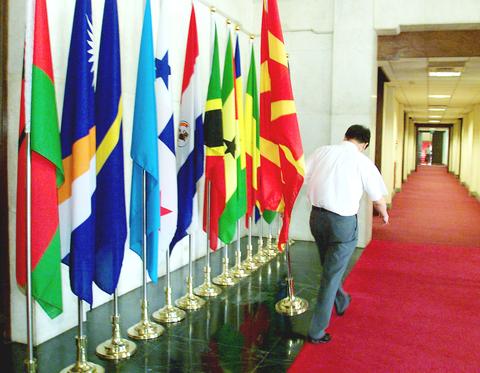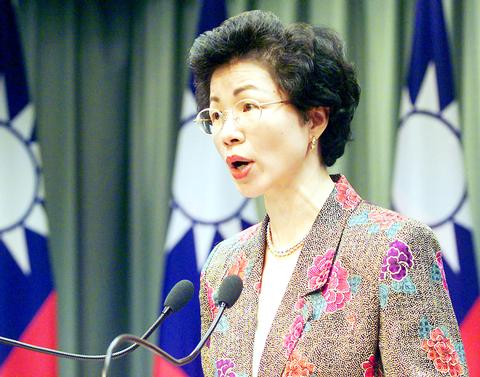Taiwan severed diplomatic ties with Macedonia yesterday and ended all economic aid to the crisis-torn Balkan state after its last-ditch effort to secure relations with the European country failed.
The end of diplomatic ties with Macedonia leaves Taiwan with 28 official diplomatic allies.

PHOTO: REUTERS
Spokeswoman for the Ministry of Foreign Affairs, Katharine Chang (張小月) made the announcement at a press conference yesterday morning. Chang noted that Macedonia wants the backing of Beijing -- a permanent member of the UN Security Council -- in its civil war and accused China of "coercing" the country into shifting recognition from Taipei to Beijing.

PHOTO: REUTERS
Chang said Taiwan "deeply regrets" that Macedonia has disregarded friendly ties between the two countries and "acquiesced to the pressure and enticement of China."
After Taiwan's announcement yesterday morning, China and Macedonia signed a joint communique in Beijing to normalize relations between the two countries, Beijing's official Xinhua news agency reported.
The statement was signed by Chinese Foreign Minister Tang Jiaxuan (
Chang said Taiwan would close its embassy in Macedonia immediately, terminate all agreements and cooperation projects between Taipei and Skopje and withdraw Taiwan's technical mission.
Chang stressed that Taiwan would not retain any "alternative" office in Skopje after breaking ties with Macedonia, saying "we will not have any representative offices there."
During Macedonia's Cabinet meeting last Tuesday, the Macedonian government decided to try to normalize its relations with China, Macedonian government spokesman Antonio Miloshoski told the Taipei Times last week.
Chang said the decision taken by Macedonia has not only seriously damaged the national interests of Taiwan, but also interrupted ongoing cooperation projects between the two countries totalling US$140 million.
"This is bound to hamper Macedonia's socio-economic development in the future," the foreign ministry statement said.
Chang's announcement came at 11am yesterday, shortly after the arrival of Macedonian Foreign Minister Ilinka Mitreva in Beijing, foreign ministry officials said.
Chang said the formation of the grand coalition government in Macedonia on May 13 spelled trouble for relations, since the new government integrated pro-China forces, thus hampering efforts of pro-Taiwan forces within the government.
Minister of Foreign Affairs Tien Hung-mao (
In view of the ethnic conflict in Macedonia that began in February and its rising anxiety over averting an imminent civil war, Macedonia has been keen on gaining China's international support in dealing with the five-month ethnic Albanian insurgency along its border with Kosovo.
China's status as a permanent member of the UN Security Council is seen as pivotal in helping Macedonia settle its domestic crisis.
Taiwan and Macedonia established diplomatic ties in January 1999 without notifying then Macedonian president Kiro Gligorov. Angered by the accord, China broke off ties with Macedonia the next month and vetoed the continuation of a UN peacekeeping mission in Macedonia in its capacity as one of the five permanent members of the UN Security Council.
Foreign ministry officials conceded that the loss of Macedonia as an ally was "a setback" for Taiwan, adding that in hindsight, changes in the the Balkan state's strategic situation made Skopje's shift of recognition from Taipei to Beijing inevitable.

Intelligence agents have recorded 510,000 instances of “controversial information” being spread online by the Chinese Communist Party (CCP) so far this year, the National Security Bureau (NSB) said in a report yesterday, as it warned of artificial intelligence (AI) being employed to generate destabilizing misinformation. The bureau submitted a written report to the Legislative Yuan in preparation for National Security Bureau Director-General Tsai Ming-yen’s (蔡明彥) appearance before the Foreign Affairs and National Defense Committee today. The CCP has been using cognitive warfare to divide Taiwanese society by commenting on controversial issues such as Taiwan Semiconductor Manufacturing Co’s (TSMC, 台積電) investments in the

INVESTIGATION: The case is the latest instance of a DPP figure being implicated in an espionage network accused of allegedly leaking information to Chinese intelligence Democratic Progressive Party (DPP) member Ho Jen-chieh (何仁傑) was detained and held incommunicado yesterday on suspicion of spying for China during his tenure as assistant to then-minister of foreign affairs Joseph Wu (吳釗燮). The Taipei District Prosecutors’ Office said Ho was implicated during its investigation into alleged spying activities by former Presidential Office consultant Wu Shang-yu (吳尚雨). Prosecutors said there is reason to believe Ho breached the National Security Act (國家安全法) by leaking classified Ministry of Foreign Affairs information to Chinese intelligence. Following interrogation, prosecutors petitioned the Taipei District Court to detain Ho, citing concerns over potential collusion or tampering of evidence. The

‘COMPREHENSIVE PLAN’: Lin Chia-lung said that the government was ready to talk about a variety of issues, including investment in and purchases from the US The National Stabilization Fund (NSF) yesterday announced that it would step in to staunch stock market losses for the ninth time in the nation’s history. An NSF board meeting, originally scheduled for Monday next week, was moved to yesterday after stocks plummeted in the wake of US President Donald Trump’s announcement of 32 percent tariffs on Taiwan on Wednesday last week. Board members voted to support the stock market with the NT$500 billion (US$15.15 billion) fund, with injections of funds to begin as soon as today. The NSF in 2000 injected NT$120 billion to stabilize stocks, the most ever. The lowest amount it

NEGOTIATIONS: Taiwan has good relations with Washington and the outlook for the negotiations looks promising, Minister of Economic Affairs J.W. Kuo said Taiwan’s GDP growth this year is expected to decrease by 0.43 to 1.61 percentage points due to the effects of US tariffs, National Development Council (NDC) Minister Paul Liu (劉鏡清) said at a meeting of the legislature’s Economics Committee in Taipei yesterday, citing a preliminary estimate by a private research institution. Taiwan’s economy would be significantly affected by the 32 percent “reciprocal” tariffs slapped by the US, which took effect yesterday, Liu said, adding that GDP growth could fall below 3 percent and potentially even dip below 2 percent to 1.53 percent this year. The council has commissioned another institution